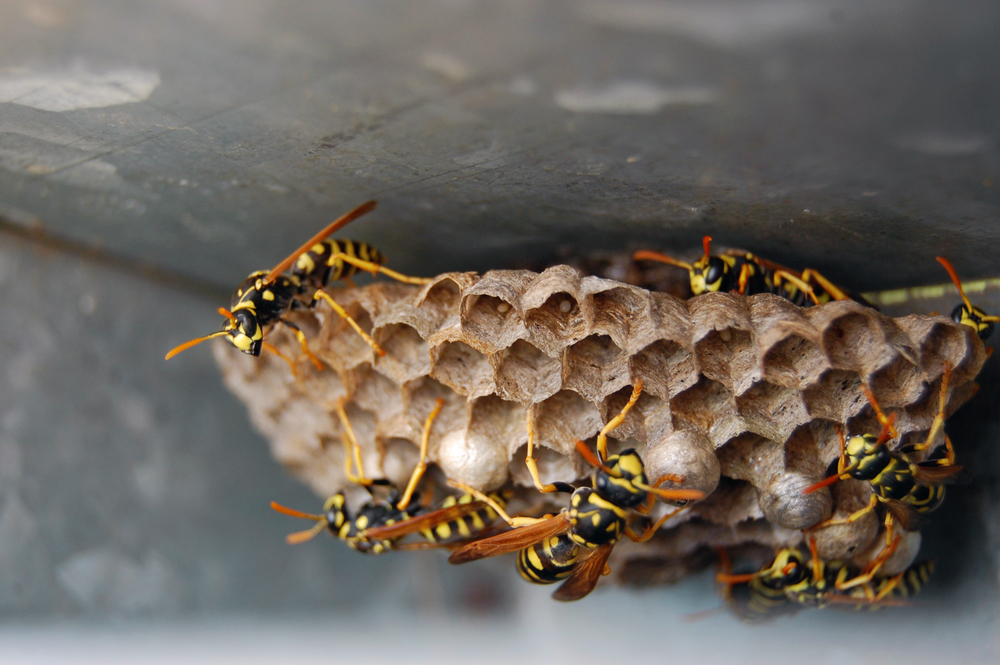Understanding Wasp Behaviour and Attraction
To get rid of wasps, it’s important to know why they come to your patio or home. Wasps look for food, water, and places to build their nests. Patios often have things like sugary drinks, food scraps, and small gaps where wasps can nest. Knowing what attracts them helps you take steps to keep them away and enjoy your outdoor spaces safely.
When is Wasp Season?
Wasp season typically runs from early spring to fall, peaking in August and September. The season begins when queen wasps emerge from hibernation in May to build new nests and lasts until around October, depending on the weather. During this time, wasps are drawn to patios and outdoor spaces for several reasons.
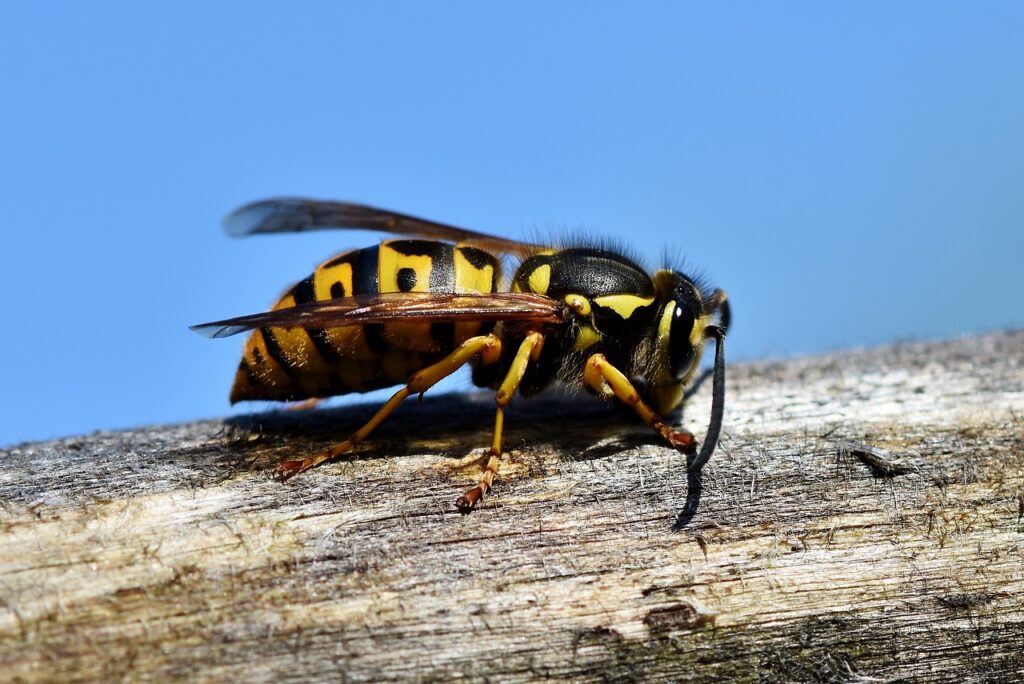
Wasps are attracted to sugary drinks like soda or fruit juice, and in the spring, they also seek out protein sources such as meat. Any leftover food or trash left out can attract wasps. Additionally, wasps need water, so they often gather near leaky faucets, birdbaths, or pet water bowls. If your drainage system isn’t functioning properly, you’re at a higher risk of attracting wasps. Keeping these areas dry and well-maintained can help reduce the likelihood of wasps nesting near your home.
How To Deter Wasps From Invading Your Home
Prevention is the best cure, especially when dealing with wasps. Once these pests have established a presence, they can be difficult and dangerous to remove, so it’s crucial to take steps to deter wasps in the first place. Before you find yourself in a situation that requires pest control, try implementing these strategies to significantly reduce the chances of wasps invading your home.
Keep the Area Clean
Wasps are drawn to food, especially sugary drinks and scraps, so keeping your outdoor spaces clean is essential to keeping them away. During gatherings, using food covers or mesh domes can help protect your food from wasps. After eating outside, promptly clean any remaining food and drinks to minimize their attraction. To keep wasps away from your trash, choose trash cans with tight-fitting lids and empty them regularly, especially during the warmer months when wasps are most active.
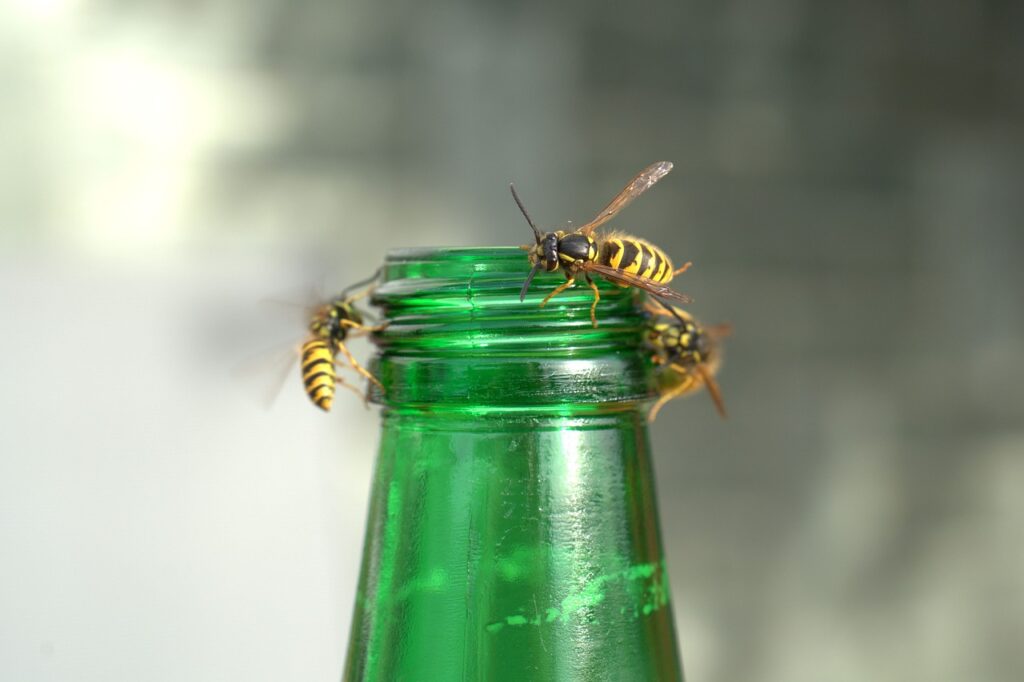
Using scent-neutralizing trash bags can help mask any odours that might attract wasps. Additionally, cleaning your trash cans with soapy water and a mild disinfectant will eliminate lingering odours that could draw them in. Avoid items that mimic the scents of wasps’ natural food sources, like fruit-scented candles or floral centrepieces, to further reduce the chances of attracting them. By following these tips, you can create a cleaner, more wasp-resistant environment around your home.
Seal Cracks and Gaps
One of the most effective ways to prevent wasps from entering your home is to seal any cracks, crevices, or gaps using caulk, expanding foam, or similar materials. Focus on small holes in brickwork, siding, and around utility lines. For larger gaps, use weatherstripping or mesh to block entry points. Make sure all windows and doors close tightly, and replace any worn or damaged weatherstripping. At Thornton Hardscape Inc., we can perform tuckpointing and other masonry repairs to fix holes in your brick or stonework.
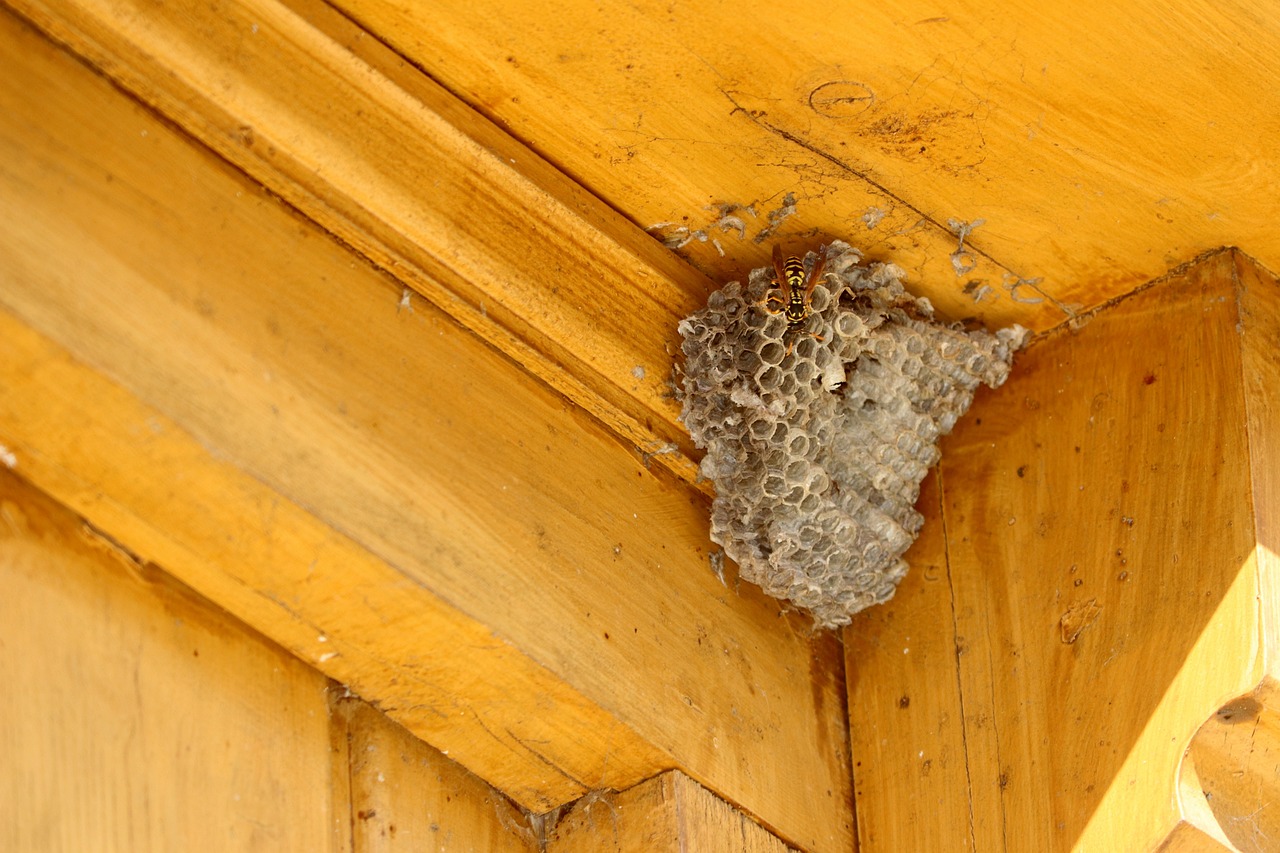
Inspect roof eaves, attic spaces, and where the roof meets the walls, and seal any gaps you find. Cover attic vents, chimney openings, and other ventilation areas with fine mesh screens to keep wasps out while allowing airflow. Also, repair or replace damaged siding or roof shingles quickly. Seal gaps around utility lines, pipes, and cables, and make sure garage and shed doors close properly. Install door sweeps to block any gaps at the bottom of doors.
Proper Landscaping
A properly landscaped outdoor space can help repel wasps by incorporating wasp-repellent plants like mint, citronella, and eucalyptus around patios and seating areas. On the other hand, it’s wise to avoid highly fragrant flowers, such as peonies or jasmine, which can attract wasps. Regularly trimming bushes, hedges, and trees, along with promptly removing any rotting fruit from your garden, will further reduce the likelihood of wasps finding your space appealing.
Incorporating hardscaping elements can also enhance your wasp prevention strategy. Interlocking pathways, patios, and retaining walls decrease the amount of exposed soil and plant life, making the area less inviting to wasps. By strategically placing wasp-repellent plants near outdoor living areas and ensuring proper drainage in water features, you can create an environment that is both beautiful and less attractive to wasps. Thornton Hardscaping can install these features, combining aesthetics with practical solutions to keep your outdoor spaces wasp-free.
Natural Wasp Repellents
If you prefer a natural approach to keeping wasps away from your patio and outdoor spaces, essential oils like peppermint, clove, and lemongrass are highly effective. These oils have strong scents that repel wasps, making them excellent natural deterrents. To create a repellent spray, mix a few drops of these essential oils with water and apply the spray to areas where wasps are likely to build nests, such as under eaves, around windows, or in the corners of your outdoor spaces.
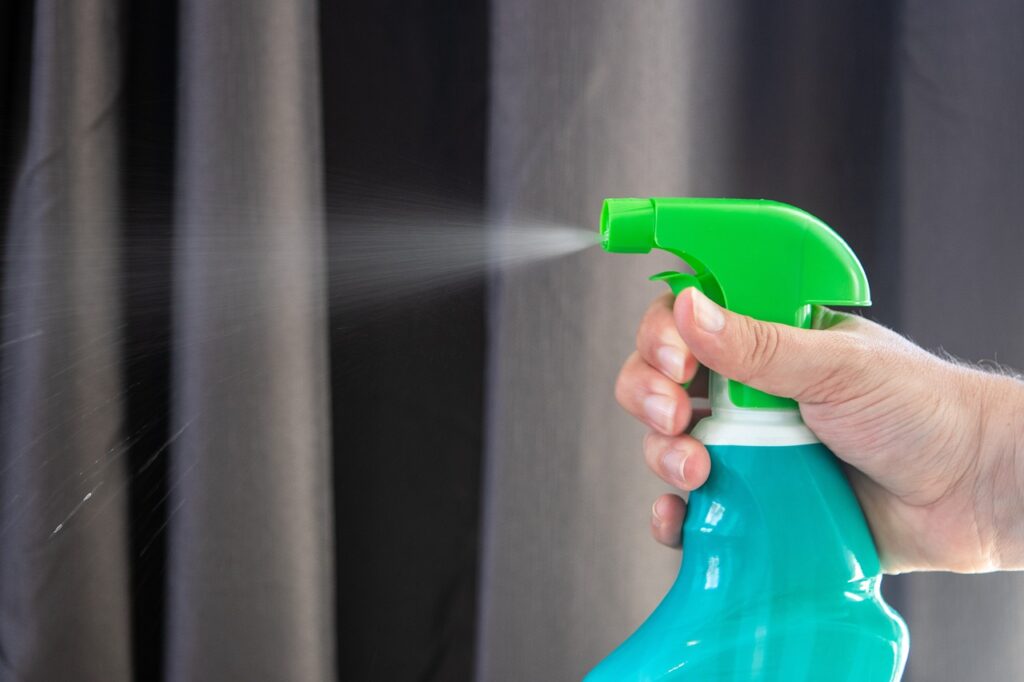
For added protection, you can soak cotton balls in these essential oils and place them around your garden or patio. This method provides continuous deterrence, helping to keep wasps away from areas where you spend time. While essential oils are effective, you can also use white vinegar as a natural wasp repellent. White vinegar has a strong scent that wasps dislike, making it a useful addition to your DIY wasp-repellent strategies. By using these natural repellents, you can enjoy your outdoor spaces without worrying about wasps invading or building nests nearby.
Commercial Wasp Repellents
When natural repellents aren’t enough or your wasp problem has grown too large, commercial wasp repellents are a highly effective solution to keep wasps away. These products are specifically designed to either repel or kill wasps on contact, providing reliable protection for your outdoor spaces. They are particularly useful when dealing with a large wasp population or when a wasp nest has already been established nearby.
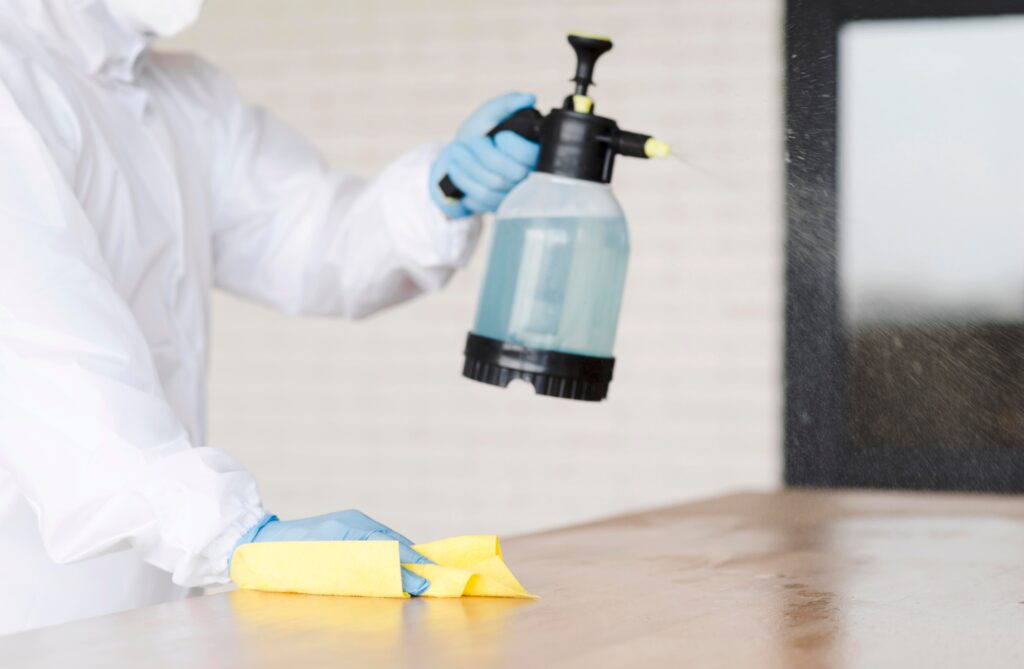
Commercial sprays are among the most effective options for targeting wasp nests directly. They allow you to spray nests from a safe distance, quickly eliminating the threat posed by aggressive species like yellow jackets or bald-faced hornets. Additionally, wasp traps are a valuable tool for ongoing management. These traps lure wasps in with bait, capturing them and reducing the overall number of wasps around your property. By using commercial wasp repellents and traps, you can effectively manage and prevent wasps from making your outdoor space their home.
Fake Wasp Nests
An unconventional yet highly effective strategy for keeping wasps away from your home is the use of fake wasp nests. Wasps are territorial by nature and typically avoid building their nests near others. By placing fake wasp nests around your patio, garden, or other outdoor spaces, you can discourage wasps from building nests nearby and help maintain a wasp-free environment.
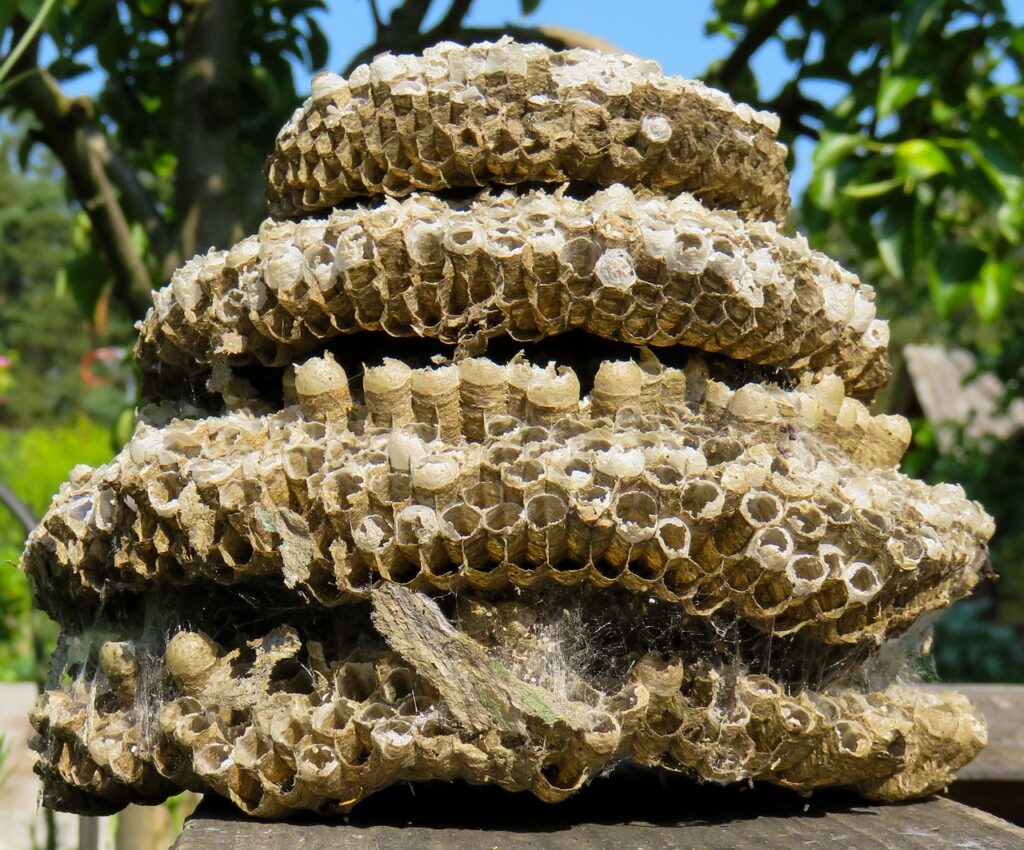
Timing and placement are crucial to maximizing the effectiveness of fake wasp nests. It’s best to hang them early in the season before wasps start searching for nesting sites, especially under porch roofs, tree branches, or other ledges where wasps often build nests. While fake wasp nests are an easy and non-toxic method to deter wasps, they are most effective when combined with other preventative measures, such as proper landscaping, eliminating food scraps, and ensuring regular maintenance to keep wasps away.
Maintaining a Wasp-Free Environment
Maintaining a wasp-free environment requires consistent effort and attention to detail. Regularly check for new wasp nests around your outdoor space to keep your patio safe. Keeping wasps away involves promptly cleaning up food scraps, securing garbage cans, and eliminating standing water, which are key factors that attract wasps. If you notice ongoing wasp activity or find a wasp nest nearby, it’s important to take preventative measures to avoid a severe infestation.
At Thornton Hardscape Inc., we specialize in designing outdoor spaces that naturally deter wasps from building nests. By incorporating strategic plantings and landscaping, effective landscape drainage systems, and well-placed hardscape features, we can help create an environment that is less inviting to wasps. For a safer, more enjoyable environment, trust our expertise in preventing wasps from settling near your home.
